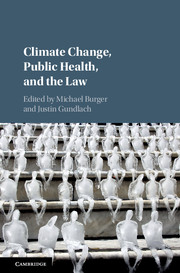Book contents
Part II - Cross-Cutting Issues
Published online by Cambridge University Press: 05 October 2018
Summary
Information is a powerful tool that government can use to inform the public about the risks of climate change, how to mitigate those risks, and how to reduce emissions of the greenhouse gases responsible for climate change. This chapter addresses the role the First Amendment plays when the government uses information to promote public policies on climate change. The chapter explains that the government has vast leeway to collect and disseminate information and the First Amendment presents no barrier to the government’s use of information tools when the government itself is the speaker. But the First Amendment does come into play when the government enlists or compels others to carry the government’s message. The First Amendment may, in some cases, limit the government’s power to compel speakers to engage in speech on matters of opinion or on subjects that might be considered controversial. The First Amendment generally limits government’s ability to force speakers to adhere to the government’s views. And the First Amendment may constrain the government’s ability to rid the marketplace of advertising claims that may over-promise environmental benefits, but are not demonstrably false or misleading. These constraints, however, do not pose a serious obstacle to the government’s ability to use information tools to help in the fight against climate change.
- Type
- Chapter
- Information
- Climate Change, Public Health, and the Law , pp. 73 - 168Publisher: Cambridge University PressPrint publication year: 2018

